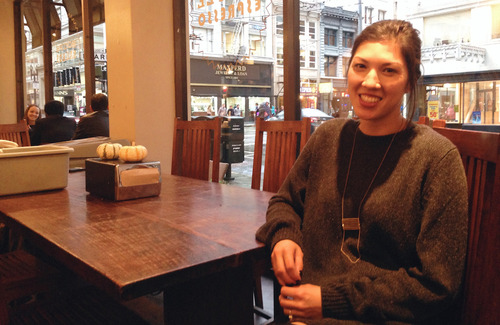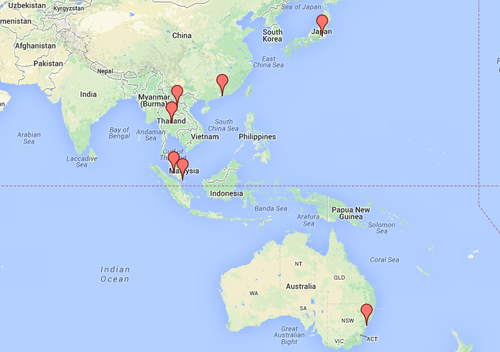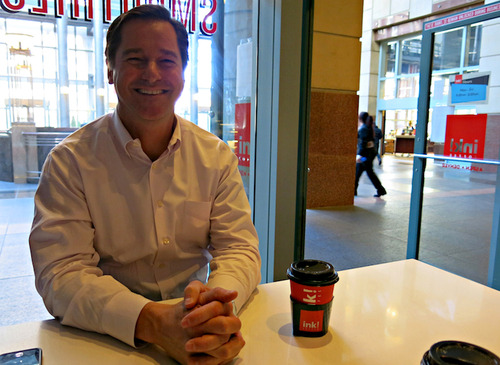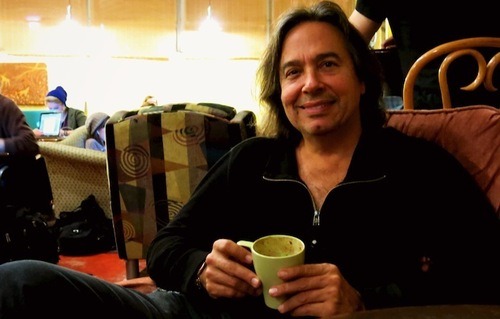Cup 3 intimidated me.
It’s a feeling I’m unfamiliar with when it comes to coffee.
She intimidated me the day I met her in Austin, Texas at the South by Southwest tech conference two years ago—and that was before I learned of the reputation she’d built as a Silicon Valley thought-leader on community building after playing a pivotal role in the early stages of successful startups Yelp and Airbnb.

When you meet Ligaya Tichy you immediately sense the passion and drive behind her caring personality, sharp wit and intrepid style.
My nerves led me to realize I hadn’t talked to many women my age in the first round of Cups. Furthermore, the women I did talk to weren’t in the tech space. The reason, I concluded, is it’s tough to write about phenomenal women without feeling inferior. I’d rather extol the accomplishments of someone chasing dreams significantly different than my own.
…
We met in a crowded coffee shop in San Francisco’s Financial District. Ligaya walked in wearing stylish black pants with edgy tears down the front. We ordered our coffee and found a cozy spot at large community table. Between sharing mutual friends, working in the same industry and having met before, launching the conversation was easy.
…
Born in Boston and raised in a small hippy town in Iowa, Ligaya studied Anthropology and International Relations at Tufts University. Working several jobs throughout college to pay her tuition, Ligaya didn’t have time to worry about what happened post-college. Although, even if she had, she likely wouldn’t have worried much. Ligaya is the type that trusts her intuition will lead her down the right path.
Without much foresight, Ligaya sold all her possessions after graduation and moved to Bali where her aunt had founded a birthing center in an area that had little access to developed healthcare. She was deeply moved by the experience, and several years later she became a certified doula, trained to help coach women through childbirth.
While still in Bali, but facing expiring visas, Ligaya and her boyfriend at the time discussed their prospects. They were big fans of House music and caught wind of the thriving House scene in San Francisco. A friend offered her couch as a landing pad so with nothing more than a backpack full of sarongs, Ligaya followed her intuition to a new adventure in California. With the little money she had, a coat and pair of pants purchased from goodwill, and a strong sense of determination and work ethic, Ligaya set out to find a job in the new city.
…
Close to a decade later, Ligaya’s life looks nothing like when she first arrived. In fact, she never imagined life would turn out so well—her enthusiasm and dedication led to a career many in the tech space only dream about. Soon after arriving in San Francisco she discovered and fell in love with Yelp, which at the time was a fledgling company. Ligaya relentlessly badgered the CEO for a job; declaring she’d sweep the floors if that’s what it would take to be a part of Yelp’s mission.
Yelp relented and offered her a operations manager role, which began her rise to becoming a well-known community builder in the Valley. Ligaya launched and developed several key markets for Yelp before leaving after four years to do the same for the housing rental site, Airbnb. When the community at Airbnb reached a stable level, Ligaya left and now enjoys a more balanced lifestyle serving as a mentor and investor for early-stage startups while spending plenty of quality time with her fiancé and dog.
…
When I met Ligaya in Austin she had an edgy haircut, bold lipstick and confident presence. I was a senior in college and remember thinking, I wish I had the courage to be so brazen and bold.
Sitting down to coffee with Ligaya was my chance to uncover the source of that confidence and enthusiasm—what emerged from our conversation was a thought-provoking look at careers, authenticity and the quest to live a meaningful life.
…
In her own words, Ligaya addresses the pressures of tough career choices (contains expletives).
Ligaya grew up in a progressive community and her passion and audacity may, in part, come from her father: a renaissance man with great artistic talent and strong opinions. It might also come from failed attempts at fitting in:
We were one of the only non-white families. My mom was Asian, my dad Czech. Even just having immigrant parents was different and I never fit in. I had a weird name that no one could pronounce (‘Ligaya’, she explained, rhymes with papaya).
I have a friend, Cici, who is Chinese and also grew up in the midwest. We talked about how when we were younger we wanted to have blond hair and blue eyes and just fit in. Well, you hit a certain point in your life where you just shrug it off because you know it’s never going to happen. I think this engendered an attitude of: well, if I can’t fit in why even try?
Despite that viewpoint, deciding to ignore the status quo was easier in theory than practice. The internal conflict that exists between the desire for self-expression and the fear of rejection is incredibly strong—regardless of outward confidence or attitude. Ligaya was not immune to the challenge of being authentic in a world filled with social norms and outspoken critics—but she shared a viewpoint that revealed the magic of being courageous and letting your true self shine:
If we want to keep evolving as a people we should let a little piece of ourselves out so that we can see how other people respond, so we can question our own assumptions, so we are able to evolve in some way. There’s a point where you just say it’s worth the risk. You know?
It is a really tough thing. I think it gets better as time passes; not as you get older, it’s not a perspective thing, it’s just that as you start to form relationships with people that are deeper, people you know and trust love you for you, it allows you to go a little bit further with that person. And in going deeper with that person, a little more of you comes out each time.
If you only spend time with those people, you almost can’t help but grow into who you are because when you’re with people you really love and that love you, it makes you want to share the real parts of you. It’s a good testing ground—a good practice—for being that version of yourself all the time.
It was during this explanation that my intimidation turned to appreciation. In all the coffee conversations I’ve had I’ve never directly touched on the power of relationships and the intimacy, trust, and vulnerability that happens within them—something I don’t think people talk about often enough.
Ligaya is an insightful, articulate and compassionate force. Our conversation had many topics that resonated with me: the importance of approaching life with enthusiasm, dedicating oneself to meaningful work, not being swayed by the viewpoints of others, finding a balance that makes you happy. However, it was this statement about being the authentic version of yourself that I found most meaningful.
The world is a scary place—for everyone. As Ligaya said, “Such is the human condition: suffering is inevitable”.
Regardless of wealth or success, we all wrestle with fears and insecurities. We all want to make a meaningful contribution to the world and fulfill our potential. We want to be loved and appreciated for who we are deep down.
But these hopes and desires are so raw and scary we often keep them bottled inside where they feel safe. We look around at successful and confident people (or the seemingly perfect lives we see on social networks) and decide it’s best to hide away the shadowy parts of our personality and only present our own confident and successful parts. It’s the fear of being vulnerable in an often harsh world.
This is ok to some degree, the raw parts of ourselves should be reserved for those that have earned our trust, not broadcast to the world.
As Ligaya said, finding someone, or a group of someones, that you trust love you for you creates a safe space to slowly reveal the authentic self that hides behind the social mask. This takes courage, a lot of courage. But to be vulnerable with trusted friends, family or a significant other can lead to an incredible source of power: to reveal a deeper part of yourself and receive love and acceptance in return is life-changing. Especially because as you become more comfortable being authentic around close friends, you become more comfortable being authentic all the time. And this world could use more authenticity.
Plus, you create stronger relationships with those around you:
It’s a universal thing—the deeper you get to know someone the more you realize they are struggling with the same things. And that’s actually another reason to talk about what you’re going through and talk about what you think. In a way it can be very liberating for people because they go, Oh I’m not alone in thinking this. I’m not alone in feeling this or hating this particular thing about myself. Like you said, you find strength in solidarity around these things.
I was intimidated by Ligaya because I compared her history of achievements to my inner insecurities, She’s incredibly talented and successful, why would she want to talk to me?
I know she’ll cringe when she reads those words because Ligaya doesn’t care about titles or accomplishments. Ligaya cares about people.
It is that compassion and drive to understand what makes people tick that has led her to a successful career building communities. Ligaya understands that we as humans are wired to connect and that through connection and community we create opportunities to support, educate and celebrate with each other; to become better humans that create a better world.
But first, we must find the courage to connect.
..




